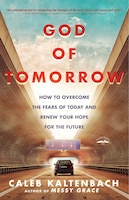God of Tomorrow by Caleb Kaltenbach

How to overcome the fears of today and renew your hope for the future
The God of Tomorrow Principle: "Since tomorrow belongs to God, we can graciously offer hope to people today."
I wasn't sure of the book when I saw it and then I saw the author, Caleb Kaltenbach. I read his other book, Messy Grace, about growing up with two homosexual parents and his journey to God and lessons on relating to the LGBTQ community. It was such a good read, I knew I wanted to read this book. It did not disappoint.
His God of Tomorrow Principle shines through the whole book: we have a God who is unchanging, we have a God who loves us, we have a God who is in charge--therefore we have hope and we have a hope that we can offer to those who are fearing tomorrow. But we don't do this blindly. We stay up to date on society, we become aware of the culture around us so we can offer this counter-cultural Gospel in a way that is appealing and relevant.
We accept our neighbors. We don't need to agree with them, but we still love and accept them. "Love relies on acceptance, not agreement." And that can be hard. It's easier to base relationships on things you agree with then on the person as a whole. This acceptance does not mean that you agree or go along with their decisions. There is a tension that exists on this and living in that tension is what enabled Caleb to eventually be able to see both of his parents become Christians.
Another thing, one of many, that challenged me in this book was respect for authority. Nero was the emperor when the Epistles were written. He was a cruel emperor, an emperor who persecuted Christians in horrible ways. But what do Paul and Peter say? "Submit yourselves for the Lord's sake to every human authority..." "Let everyone be subject to the governing authorities." "...Christians are in a position now to make a powerful difference in the world by showing respect to those in authority."
There is much more I could say, but once again, Caleb has challenged his readers to reach out to the people who are different from us, to engage them knowledgeably, to offer them hope, to accept them without agreeing with them. He also has some really good things to say about playing the victim card. Basically, he has no use for it, unless it is really true and then, generally, the true victim isn't shouting it from a housetop.
I received this book from Blogging for Books and recommend it to anyone wondering how to offer hope for tomorrow to the world around them.

Comments
Post a Comment